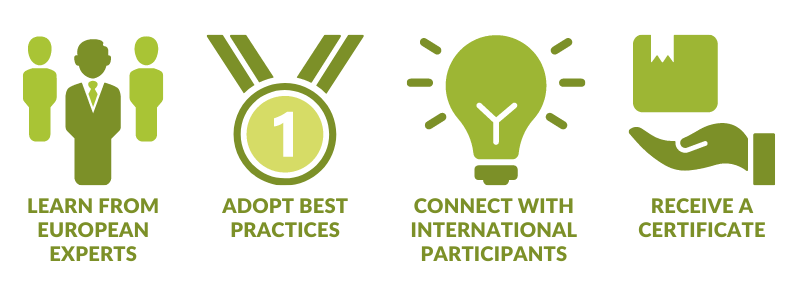Risk Assessment & Management for Perpetrator Programmes
Ensure that you know all the risks

Learn How To
- Introduce evidence-based risk assessment in your programme
- Recognise relevant risk factors
- Assess and measure risk to your clients' (ex-)partners and children
- Collaborate with victim support services and agencies in risk assessment
Best Risk Assessment training I have attended a few in the past. As a neurodiverse person some trainings are difficult to follow, this training kept my attention and challenged me.
- Shana Begum (UK)
In this training I learned about risk management in working with perpetrators and victims of domestic abuse, the pitfalls, the must dos, sharing protocols and policies and good practice. It was great to share knowledge with colleagues around the world.
- Anonymous
Training Agenda
Session 1: What is risk? Examining how you think about risk
- Explore different layers of risk assessment in perpetrator programmes
- Learn about perpetrator generated risks, service generated risks, risks around family and community, as well as structural risks
- Develop an understanding of risk as a complex phenomenon that requires ongoing work and specific expertise.
Session 2: Understanding Risk Assessment for perpetrator programmes
- Learn about risk, vulnerability and protective factors and how to apply these elements in your everyday assessments
- Explore the process of assessing risk in perpetrator work
- Build foundations for applying the most reliable methods in your work
- Analyse crucial risk factors (static, dynamic, triggers and victim vulnerability factors)
- Discuss difficulties predicting high harm cases & limitations of the work
Session 3: Unpacking what we mean when we talk about levels of risk
- Learn to understand the concepts of high, moderate and low risk perpetrators
- Understand how these categories are connected with the likelihood and severity of violence, type of harm and context
- Explore different evidence-based tools for risk assessment (e.g. DASH, SARA /B-Safer and Barnardos Risk Matrix)
- Discover how to apply the right risk assessment tool for your programme
Special focus will be given to children and assessing risk on children in situations of domestic violence, using model of "pathways of harm".
Session 4 : Implementation – From Risk Assessment to What happens in perpetrator programmes
- Learn how to move from assessing risk to managing it
- Discover best practices of risk management, covering different types of risk
- Discuss how to apply a victim-centred perspective in our risk management procedures and practice
Session 5: Practice Skills-Risk Management Meeting
- Explore characteristics of the case management meeting, an efficient and popular tool for managing risk in domestic violence programmes
- Practice on case studies
- Experience the value of evidence-based risk assessment instruments
Session 6: Roles and Responsabilities of different services
- Explore roles and responsibilities of key actors, with focus on perpetrator programmes and victim support services
- Learn how to overcome challenges in establishing clear pathways for joint work
- Discover cooperation protocols that can be easily adapted to the local context
Session 7: Managing risk and safety through information gathering and effective comparison
- Explore and understand the concept of multi-agency work
- Learn about European best practices and models
- Discuss how the most important aspects could be applied in the context of your country and community
Session 8: Developing protocols across agencies
- Learn how to set up or accelerate your multi-agency work
- Increase your impact on survivor safety
- Explore proven ways to establish long-standing cooperations
The Course
Assessing and managing the risk of repeated violence is one of the critical elements of victim-safety-oriented perpetrator programmes. However, this is a demanding and often challenging task, and professionals in the field need ongoing support to ensure they notice all risks. We designed this two-day practice-based and interactive training for perpetrator work professionals of all experience levels. The trainers will address challenging questions, such as:
- What does "risk" in domestic violence mean, and why is it relevant for perpetrator work?
- What are relevant indicators of risk for which you should watch out?
- How can you assess and measure risk? What are reliable, evidence-based tools, models and procedures?
- How can you manage risk in the context of perpetrator work in collaboration with victim support services and agencies?
The Trainers
Dr Chris Newman is the director of Partner Abuse Interventions, an independent organisation offering structured assessments of domestic violence risk and vulnerability in cases where domestic violence is a child protection concern. He is a practice supervisor and consultant to organisations working with perpetrators of domestic violence, including work within a multidisciplinary team at the Portman Clinic in London. Chris worked as a research psychologist before moving on to specialise in risk assessment, violence prevention and parenting work with those who have used violence in the family. Together with Kate Iwi, Chris also runs a training company called Partner Abuse Consultancy and Training.
Fionnuala Collins works as the Development Officer for MOVE Ireland. She provides tailored training for diverse frontline staff to support recognising, responding and referring perpetrators to programmes. Fionnuala has developed various training methods to encourage reflection, better thinking and deeper engagement with difficult topics and tasks to create good communication, protocols, and practices. She brings over 20 years of frontline experience to this role in various facilitation contexts with victims and perpetrators of abuse in family, youth and community services.
